|
|
|
Sort Order |
|
|
|
Items / Page
|
|
|
|
|
|
|
| Srl | Item |
| 1 |
ID:
137727
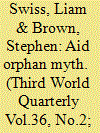

|
|
|
|
|
| Summary/Abstract |
The term ‘aid orphan’ refers to a developing country forgotten or abandoned by the development community. This metaphor has featured prominently in the development assistance policy and research literature over the past decade. Development practitioners, policy makers and researchers have defined aid orphans in manifold ways and often expressed concern over the potential fate or impact of such countries. In this paper we first examine the many definitions of aid orphans and then review the main concerns raised about them. Next we empirically examine more than 40 years of bilateral aid data to identify aid orphan countries and their common characteristics. Our findings suggest that very few countries meet the definition of aid orphan and fewer still raise the concerns collectively expressed about the orphan phenomenon. We conclude by suggesting researchers and practitioners abandon the orphan metaphor and instead focus on issues of equitable aid allocation.
|
|
|
|
|
|
|
|
|
|
|
|
|
|
|
|
| 2 |
ID:
137722
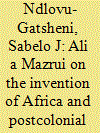

|
|
|
|
|
| Summary/Abstract |
Ali A Mazrui’s academic and intellectual fame provoked both deep admiration and severe criticism, causing his intellectual legacy to be caught up between what the South Sudanese scholar Dustan M Wai depicted as ‘Mazruiphilia’ (hagiographical celebration) and ‘Mazruiphobia’ (critical bashing). Mazrui died on 12 October 2014, leaving behind a ‘supermarket of ideas’ and a rich archive that easily immortalises him. This article aims to transcend both Mazruiphilia and Mazruiphobia through the adoption of an approach which avoids a sententious orientation while critically engaging with Mazrui’s contributions to the topical questions of the invention of Africa, Africanity and the African condition. From Mazrui’s ‘supermarket of ideas’ the article takes one of the debates in his expansive work – that of Africanity – as its departure point to engage with his contribution to African Studies and pay tribute to this African intellectual giant.
|
|
|
|
|
|
|
|
|
|
|
|
|
|
|
|
| 3 |
ID:
137736
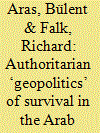

|
|
|
|
|
| Summary/Abstract |
The Arab Spring has shaken not only the state and society dimension in the countries of the MENA region but also the power of authoritarian leaders that had been ensured for a long period of time. This paper takes a critical look at the issue of how authoritarian regimes reacted to the new political atmosphere produced by the Arab Spring. More specifically it attempts to identify how geopolitical reasoning influenced the formulation of new strategies designed to promote the survival of authoritarian regimes. It focuses upon the geopolitical reasoning relied upon by Iran and Saudi Arabia, which included creating threat-enemy chains in domestic politics, shifting alliances in regional policy and taking advantage of relations with external actors to gain support for authoritarian rule at home
|
|
|
|
|
|
|
|
|
|
|
|
|
|
|
|
| 4 |
ID:
137731
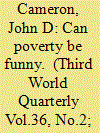

|
|
|
|
|
| Summary/Abstract |
This article examines the use of humour as a strategy to promote increased public engagement in the countries of the global North with issues of global justice. The central argument of the article is that humour can be both an ethical and an effective way of attracting and sustaining public engagement in struggles for global justice. There are risks and limits to the use of humour to represent issues of poverty and injustice but, given low levels of public engagement in these issues in the countries of the global North, humour is a risk worth taking.
|
|
|
|
|
|
|
|
|
|
|
|
|
|
|
|
| 5 |
ID:
137733
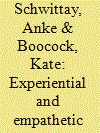

|
|
|
|
|
| Summary/Abstract |
In recent years events that physically challenge Northern publics have emerged as a new form of engagement with global poverty. In this article we examine the ‘Live Below the Line’ (LBTL) campaign, which asks participants to live on a small amount of money equivalent to the international poverty line for five days, as an example of experiential exercises that complement physical challenges with the simulation of some aspect of poor people’s lives. Drawing on interviews with participants in the 2013 New Zealand campaign, we argue that LBTL creates a limited understanding of poverty focused on poor food consumption caused by low income. While participants were able to have a more embodied and empathetic engagement with poverty, they projected their own physical and emotional sensations onto imagined poor others. As a result, stereotypes about those living in poverty were reinforced rather than challenged.
|
|
|
|
|
|
|
|
|
|
|
|
|
|
|
|
| 6 |
ID:
137743
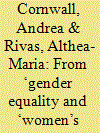

|
|
|
|
|
| Summary/Abstract |
The language of ‘gender equality’ and ‘women’s empowerment’ was mobilised by feminists in the 1980s and 1990s as a way of getting women’s rights onto the international development agenda. Their efforts can be declared a resounding success. The international development industry has fully embraced these terms. From international NGOs to donor governments to multilateral agencies the language of gender equality and women’s empowerment is a pervasive presence and takes pride of place among their major development priorities. And yet, this article argues, the fact that these terms have been eviscerated of conceptual and political bite compromises their use as the primary frame through which to demand rights and justice. Critically examining the trajectories of these terms in development, the article suggests that if the promise of the post-2015 agenda is to deliver on gender justice, new frames are needed, which can connect with and contribute to a broader movement for global justice.
|
|
|
|
|
|
|
|
|
|
|
|
|
|
|
|
| 7 |
ID:
137738
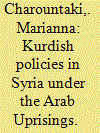

|
|
|
|
|
| Summary/Abstract |
The effect of the Arab Uprisings on the interplay of state and non-state entities is revealed as influencing the emergence of multiple players of non-state status pursuing democratic rights, and as attempting to dismiss regional despotism as an intrinsic element of ongoing transition in the Middle East. This article focuses on the positive overall effect on the Kurdish movement of unity and cooperation between KRG and PKK-PYD actors to achieve Kurdish harmony, and as interconnected paradigms vis-à-vis their influence and interaction with regional players. Given the rise of the Kurds in Syria and the KRG’s regional importance as the first actual Kurdish de facto state entity, the PKK’s role appears key for unifying and institutionalising the relatedness of the Kurdish movements in Iraq and Syria. An empirical understanding of the Kurdish case, explained through a conceptual model of ‘multi-dimensional interrelations’, may further clarify how the theoretical framework can be applied to International Relations
|
|
|
|
|
|
|
|
|
|
|
|
|
|
|
|
| 8 |
ID:
137725
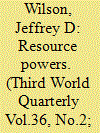

|
|
|
|
|
| Summary/Abstract |
The rise of new economic powers has seen increasing attention focused on the international role of the BRICS countries. Importantly, a common feature uniting the BRICS is that they are all resource-rich, and many analysts (and some BRICS governments) have argued that natural resources are one of the key factors propelling the rise of the group. This article explores the BRICS’ emerging status as ‘resource powers’, examining how resource wealth underpins their economic development and foreign policy strategies, and thus contributes to their growing influence in international affairs. It is argued that through the use of nationalistic mining and energy policies, the BRICS governments have exploited natural resources for both domestic economic and international diplomatic objectives. However, there are several challenges and emerging risks facing the BRICS’ resource strategies, which mean that resource wealth is making a positive – though inherently limited – contribution to the growing international status of the group.
|
|
|
|
|
|
|
|
|
|
|
|
|
|
|
|
| 9 |
ID:
137745


|
|
|
|
|
| Summary/Abstract |
The fourth volume of Michael Mann’s The Sources of Social Power is the last in his historical sociological series, which has centred on an analysis of ideological, economic, military and political power in human societies from the start of civilisation. Mann’s final volume provides an important overview of the period of American hegemony and its worldwide effects, the rise and crisis of neoliberalism, the contrasting fates of the USSR and Maoist China, the vagaries of American empire, and modern revolutions. The implications of his study, particularly regarding the history and theory of revolutions, are of the utmost value to anyone on the Revolutionary Left today, especially in the Third World. While Mann’s study is primarily focused on the West, it provides important lessons to be drawn for the Third World.
|
|
|
|
|
|
|
|
|
|
|
|
|
|
|
|
| 10 |
ID:
137729
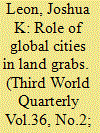

|
|
|
|
|
| Summary/Abstract |
Key trends link a globally connected urban archipelago and its hinterlands, warranting new studies of power in its most contemporary forms. This article locates land power and where that power is exercised – looking at the burgeoning global land rush from the perspective of cities. Urbanisation continues to drive vast political transitions, uprooting longstanding agrarian modes of living while creating myriad inequalities within cities. Are the world’s most powerful agglomerations active agents in this transformation? Answering affirmatively, the article reframes urbanisation as a vast, global geopolitical transfer of power from rural to urban. Leading global cities like New York, London, Hong Kong, Chicago and Singapore are not merely impressive collections of factor endowments. They are also sites of concentrated power with coercive influences beyond municipal boundaries. The article asks how cities project power in the contemporary global system. Juxtaposing data on global connectivity with the location strategies of private firms, we learn that the world’s most successful global cities are also sources of exploitative accumulations of land.
|
|
|
|
|
|
|
|
|
|
|
|
|
|
|
|
| 11 |
ID:
137740
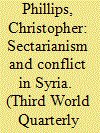

|
|
|
|
|
| Summary/Abstract |
This article challenges the sectarian narrative of Syria’s current civil war, which relies on several false assumptions about the nature of political identity. It first questions how sectarian the uprising and civil war actually are, suggesting that the conflict is ‘semi-sectarian’, given the multiple other fault lines of contention, notably class, ideology and other non-sect, sub-state ties. It then draws on the theoretical debates between primordialists, ethno-symbolists and modernists to historicise political identity development in Syria. In doing so, it reasserts the modernist case, emphasising how political identities in Syria, both national and sectarian, have developed in a complex interrelated manner in the modern era and how the recent violent mobilisation of sectarian identity is the result of long- and short-term structural, economic, socio-cultural and political factors rather than unchanging ancient animosities. Of these, the most vital remain structural changes and elite reactions to them, with the prospect of state collapse in Syria’s future the most likely cause of a descent into further sectarian chaos.
|
|
|
|
|
|
|
|
|
|
|
|
|
|
|
|
| 12 |
ID:
137734
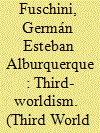

|
|
|
|
|
| Summary/Abstract |
This article examines the trajectory of the concepts ‘Third World’ and ‘Third-worldism’ in Uruguay, and attempts to prove that, although Third-worldism developed thoroughly as sensibility, it did not have the same success as ideology. The article examines authors and intellectual groups who reflected on the Third World, and especially on ‘tercerismo’ (Third Position) – understood as a set of ideas related to Third-worldism but not part of Third-worldism as such. It next explains the importance of the thought of Carlos Real de Azúa, identified as the main ideologist of Third-worldism in Uruguay. The research shows as a result that there was great concern about the Third World, especially in the 1960s and the 1970s, expressed in articles, reports and speeches, among others. Nevertheless, a full conceptualisation was never realised, except in the contribution made by Real de Azúa. The article concludes that, paradoxically, ‘tercerismo’ blocked the development of more elaborated third-worldist thought in Uruguay.
|
|
|
|
|
|
|
|
|
|
|
|
|
|
|
|
| 13 |
ID:
137742
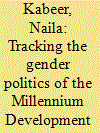

|
|
|
|
|
| Summary/Abstract |
This article tracks the gender politics of the processes that led to the adoption of the Millennium Development Goals and that continued to feature in subsequent policy debates. It suggests that this politics is rooted in tensions between conceptualisations of rights and capabilities that characterised the preceding decade. While feminist organisations made major gains on women’s rights during 1990s, it was a narrow version of human capabilities that defined the MDGs. Feminist efforts since then have focused on defending sexual and reproductive rights in the face of the attacks mounted by an ‘unholy alliance’ led by the Vatican and supported by a shifting group of countries and religious groups. This has led to the relative neglect of the economic injustices associated with the dominant market-led model of development.
|
|
|
|
|
|
|
|
|
|
|
|
|
|
|
|
|
|
|
|
|